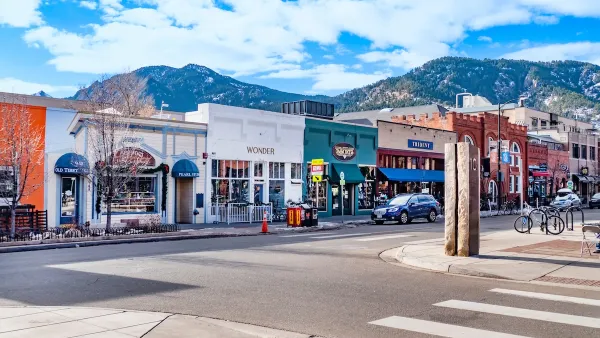In an opinion piece for The New York Times, Allison Arieff considers the next phase of the "American Dream," as the notion of trading in the ideal of the home as fortress for the home as part of a larger whole gains widespread traction.
The cultural mechanisms, regulations, and incentives that encouraged sprawl-based development for the latter half of the last century are so entwined with the myth of the "American Dream" that they've been hard to untangle, even as changing tastes, demographics, and economic realities have heralded their expiration.
But Arieff finds reason for optimism: "In short, builders are recognizing that buyers (and renters, too!) value the neighborhood as much as - if not more than - the house. And what they want from that neighborhood might not be McMansions and four-car garages after all. Resale value may not in fact trump all else. Young and old, whether they're in the city or the suburbs, want to walk to places like restaurants and shops."
"The country could be moving toward something much better, something that's less about consumption (of stuff, of such essential resources) and more about quality of life. Neighborhood groups have perhaps never been so strong a force, joining together to create an array of community-building offerings that make shared space the place to be (rather than the place to enter the garage from)."
But the forces of the status-quo, well-funded and well-organized, are digging in, and equating, "Any threat to the McMansion of yore...to 'feudal socialism.'"
Arieff concludes that, "Living better and smarter shouldn't be a partisan issue, nor should attempts at facilitating it be equated with destroying 'our fundamental rights and liberties as a people.'"
FULL STORY: The American Dream: Phase II

Maui's Vacation Rental Debate Turns Ugly
Verbal attacks, misinformation campaigns and fistfights plague a high-stakes debate to convert thousands of vacation rentals into long-term housing.

Planetizen Federal Action Tracker
A weekly monitor of how Trump’s orders and actions are impacting planners and planning in America.

Chicago’s Ghost Rails
Just beneath the surface of the modern city lie the remnants of its expansive early 20th-century streetcar system.

Bend, Oregon Zoning Reforms Prioritize Small-Scale Housing
The city altered its zoning code to allow multi-family housing and eliminated parking mandates citywide.

Amtrak Cutting Jobs, Funding to High-Speed Rail
The agency plans to cut 10 percent of its workforce and has confirmed it will not fund new high-speed rail projects.

LA Denies Basic Services to Unhoused Residents
The city has repeatedly failed to respond to requests for trash pickup at encampment sites, and eliminated a program that provided mobile showers and toilets.
Urban Design for Planners 1: Software Tools
This six-course series explores essential urban design concepts using open source software and equips planners with the tools they need to participate fully in the urban design process.
Planning for Universal Design
Learn the tools for implementing Universal Design in planning regulations.
planning NEXT
Appalachian Highlands Housing Partners
Mpact (founded as Rail~Volution)
City of Camden Redevelopment Agency
City of Astoria
City of Portland
City of Laramie




























